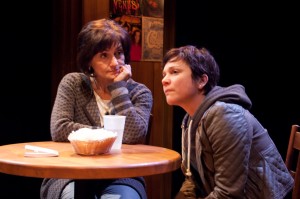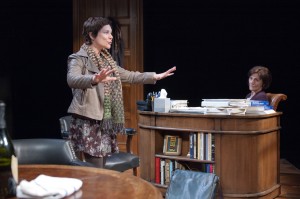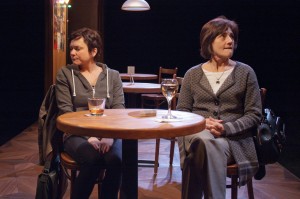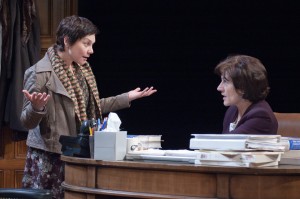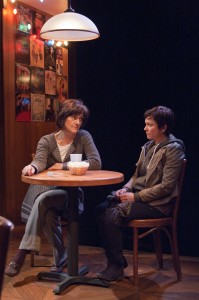ANATOMY IS NOT DESTINY
Bursting with more arguments than solutions — cerebral, metaphorical and personal (sometimes simultaneously) — Sarah Treem’s two-act, two-person drama is also two plays: Two evolutionary biologists present conflicting theories of the sexual survival of the fittest, centering on menstruation and menopause. At the same time, these women — who are, not incidentally, mother and daughter — unpack issues of abandonment, love as stress or fulfillment, nature vs. nurture, and independence versus security. It’s a full plate and, to mix images, sometimes its cup runneth over.
On this heavily freighted voyage, Keira Fromm’s staging, an absorbing Chicago premiere by TimeLine Theatre Company, works doggedly to keep things clear as well as compelling. It helps that Janet Ulrich Brooks and Elizabeth Ledo have mastered this daunting material, far more efficiently than an audience can at only one hearing. The How and the Why (its title pointing to the more difficult search for a reason as well as a cause) turns scientific speculation into a lively playground, if not battleground, with the same brio (and subject matter) of Showtime’s superb Master of Sex series.
The first act, set in a senior professor’s chambers in Cambridge during the annual conference of NORB (National Organization of Research Biologists), brings together Brook’s Zelda Kahn, a seasoned investigator, with Ledo’s Rachel Hardeman, the 28-year-old daughter who Zelda gave up for adoption. Zelda warmly encourages Rachel, who is now an ambitious NYU graduate student in biology, to present her supposedly bold new theory that menstruation is nature’s way of purging the womb of male pathogens, specifically sperm. (We’re told that this repudiation of the male role in reproduction will change how we see sex, though the play never says how or why.)
Rachel’s theory (which was debunked in 1996) counters one that her mother devised when she was the same age’”the still respected “grandmother hypothesis”: It holds that women live longer’”even after menopause supposedly ends their role as breeders–because they’re essential to not just bear children but, more importantly, to rear them. If wives were always fertile and pregnant, the offspring would suffer inattention and neglect. Women in effect clean up the messes left behind when men spill their seed.
When Rachel wants her boyfriend Dean included in her lecture (since he contributed to the theory), Zelda strenuously objects. (By dismissing the man’s role, she in effect repeats her own break from the researcher she loved then abandoned; just as she would the baby he gave her.) Self-sufficient Zelda doesn’t need love and thinks her daughter will be all the stronger for rising above its suspiciously selective deceptions. (Of course, it’s blatantly ironic that someone who built a reputation by proving the nurturing necessity of mothers never acted as one herself.)
When Rachel’s presentation goes very awry, it’s up to the second act to clean things up — but it also introduces even more “baggage,” including a few too many back stories and a terminal disease. Reunited at a Boston dive bar, both women are now free to act as mother and daughter, not scientist and acolyte. But friction continues: Zelda wants to make good. But Rachel, depressed that her career has died before 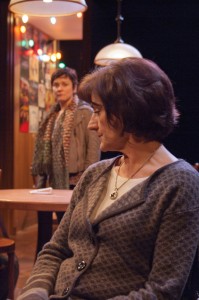 she could prove her worth, won’t let her mother make up for lost time. Through some heavy healing they’re able to reconcile both their contending theories (through an overly symbolic reappraisal of the cervix) and their unfinished business as egg donor and spawn.
she could prove her worth, won’t let her mother make up for lost time. Through some heavy healing they’re able to reconcile both their contending theories (through an overly symbolic reappraisal of the cervix) and their unfinished business as egg donor and spawn.
No question, Treem has written a schematic balancing act between science and life, theory and action. Textured and sometimes talky, The How and the Why is much better at addressing the former than the latter. The two plays that happen here don’t always come together after they pull apart.
Happily, for these well-matched, intensely centered actors, The How and the Why is much more than an emotional debate — it’s a tour de coeur: Brooks’ assertive confidence (even in defense mode) is a tonic to Ledo’s vulnerable searcher, a daughter whose hunger for more is a force in itself. And it’s refreshing to see a play that knows how to do without men. Just don’t ask why.
The How and the Why
TimeLine Theatre, 615 W. Wellington Ave.
ends on April 6, 2014
for tickets, call 773.281.8463×6
or visit TimeLine
for more shows, visit Theatre in Chicago

